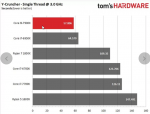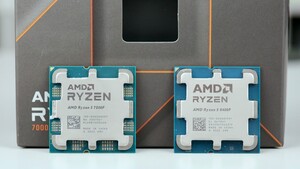Krautmaster
Fleet Admiral
- Registriert
- Feb. 2007
- Beiträge
- 24.321
naja Intel wird das wohl so machen da die CPU in deren Augen wohl kühl genug läuft und Prime AVX Load wohl untypisch sind, genau wie das Intel Thermal Tool.
Ohne AVX kommt THG ja auf 50-65°C Core Temp was absolut im Rahmen wäre, vermutlich auch für jede halbwegs taugliche LuKü.
Mich würde interessieren wie hoch das Teil bei Handbrake heizt. Mal eben Ryzen AVX vs Skylake AVX stellen is gar nicht so einfach da die Leistung hier auch weit auseinander geht.
https://techreport.com/review/31366...zen-7-1700x-and-ryzen-7-1700-cpus-reviewed/12
ergo ist ein Vergleich rein über AVX schon recht schwammig. Sowohl was Verbrauch als auch Temperatur angeht.
Schaut man sich zb die Werte bei Teillast an sieht es weit weniger schlimm aus, genau wie die THG Temperaturen bei "Non AVX Last".
http://www.tomshardware.com/reviews/intel-core-i9-7900x-skylake-x,5092-10.html
Toll ist das Ergebnis zwar nach wie vor nicht aber man ist etwa auf Broadwell 10C Niveau, bei besserer Performance. Ryzen geht mit Teillast offensichtlich auch sehr gut um.
Intel wird sich dennoch viel Mühe geben müssen dem Threadripper was vernünftiges entgegen zu stellen. Ob man da mit den 500Mhz mehr Turbo viel gewinnen kann, ich bin mal gespannt.
To illustrate our point, we plotted the temperature for all of the Core i9-7900X’s cores at stock settings running Prime95 or LuxRender. A good custom water-cooling loop does fairly well, which shouldn't come as a surprise. However, no other thermal solution will be able to keep up. Even the motherboard manufacturers we spoke to agree, telling us about their all-in-one liquid coolers running out of headroom as soon as they ran Prime95 without limiting AVX.
Ohne AVX kommt THG ja auf 50-65°C Core Temp was absolut im Rahmen wäre, vermutlich auch für jede halbwegs taugliche LuKü.
Mich würde interessieren wie hoch das Teil bei Handbrake heizt. Mal eben Ryzen AVX vs Skylake AVX stellen is gar nicht so einfach da die Leistung hier auch weit auseinander geht.
Given how similarly DAWBench scales compared to the Y-Cruncher results on our opening pages, it's probably safe to say that Reaper and our plugin of choice both lean hard on AVX instructions (and AVX2, where available) to do their thing. We think that's evidenced by the big leap in performance enjoyed by newer chips with AVX2 support like Zen.
Intel's cores still have an undeniable advantage in SIMD throughput, though. The four-core, eight-thread Core i7-7700K does about as well as the eight-core, 16-thread Ryzen 7 1700 in this test, highlighting the fact that Zen's floating-point unit has to halve its throughput in order to execute 256-bit AVX instructions
https://techreport.com/review/31366...zen-7-1700x-and-ryzen-7-1700-cpus-reviewed/12
ergo ist ein Vergleich rein über AVX schon recht schwammig. Sowohl was Verbrauch als auch Temperatur angeht.
Schaut man sich zb die Werte bei Teillast an sieht es weit weniger schlimm aus, genau wie die THG Temperaturen bei "Non AVX Last".
http://www.tomshardware.com/reviews/intel-core-i9-7900x-skylake-x,5092-10.html
Toll ist das Ergebnis zwar nach wie vor nicht aber man ist etwa auf Broadwell 10C Niveau, bei besserer Performance. Ryzen geht mit Teillast offensichtlich auch sehr gut um.
Intel wird sich dennoch viel Mühe geben müssen dem Threadripper was vernünftiges entgegen zu stellen. Ob man da mit den 500Mhz mehr Turbo viel gewinnen kann, ich bin mal gespannt.
Zuletzt bearbeitet:




